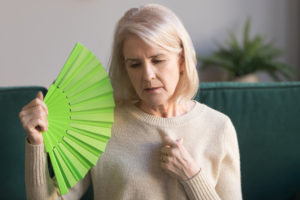
Sleep disturbance is a huge detriment for women going through menopause. It has the power to impact how you feel while experiencing symptoms.
Lost sleep can lead to stress, lower mood, brain fog, fatigue, appetite changes, and other issues the following day.
It can also boost the risk for high blood pressure, memory trouble, other cognitive issues, and other long-term conditions if sleep loss is consistent.
Researchers were intrigued by the survey results because it shows that women who experience night sweats during menopause may be at an even bigger disadvantage than those who only experience hot flashes.
Night sweats and hot flashes may sound similar, but they are not the same. A hot flash can happen day or night but might not include sweating, while night sweats are periods of intense perspiration during the night.
The survey revealed that night sweats were highly associated with depression and stress, while hot flashes, even when they happened at night, were only associated with depression.
Further, women who experienced hot flashes at night had significantly higher depression scores than those who mostly had them during the day.
Of course, you can’t just stop your body from experiencing symptoms; unfortunately, all you can do is try to manage them.
Although you can’t control or eliminate night sweats, you may be able to create an environment that is more conducive to dealing with them.
This may include wearing breathable fabrics to bed and as bed linens, keeping a fan beside your bed, turning the temperature slightly lower in the bedroom, and looking into climate-controlling pillows and mattresses.